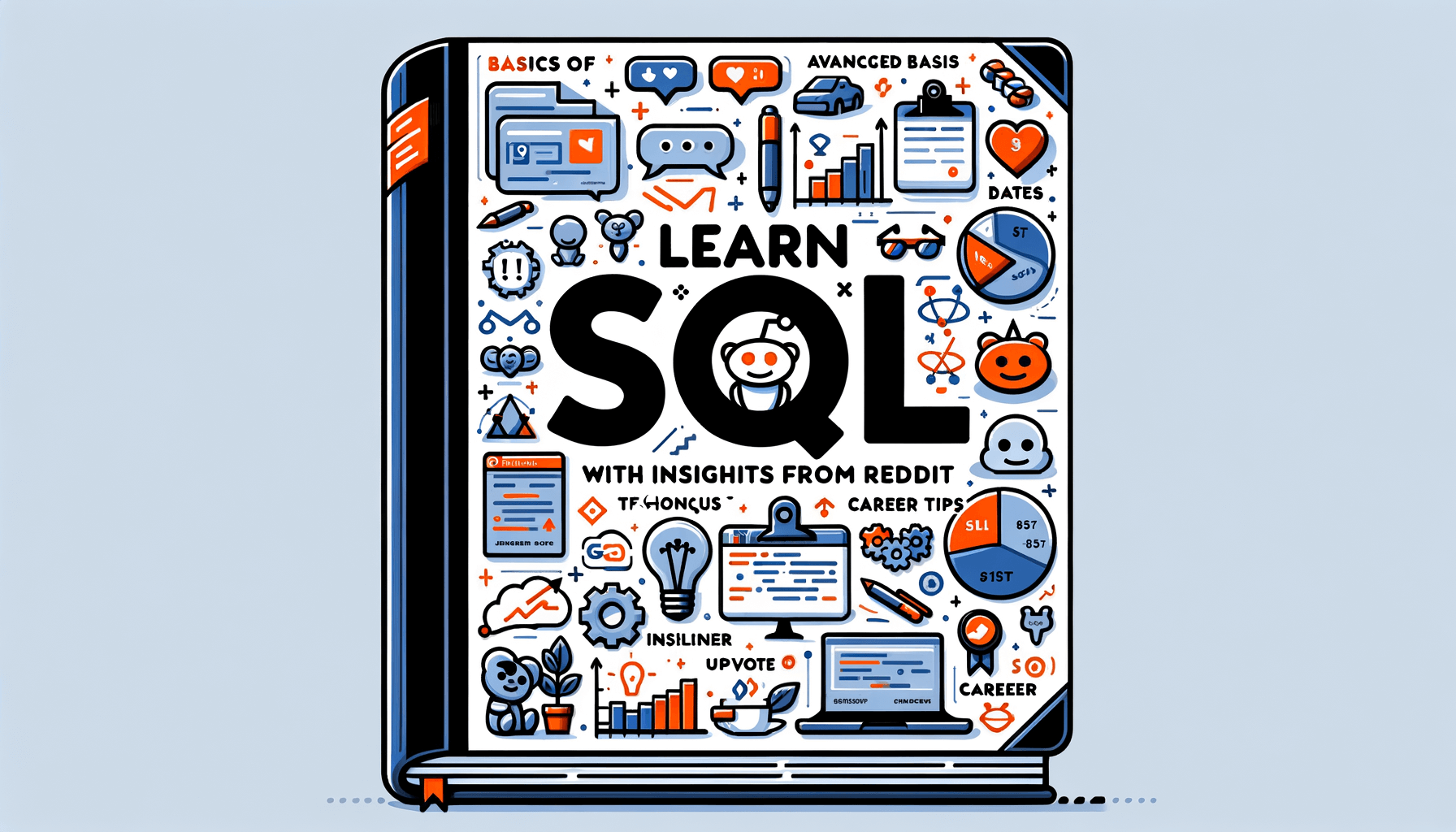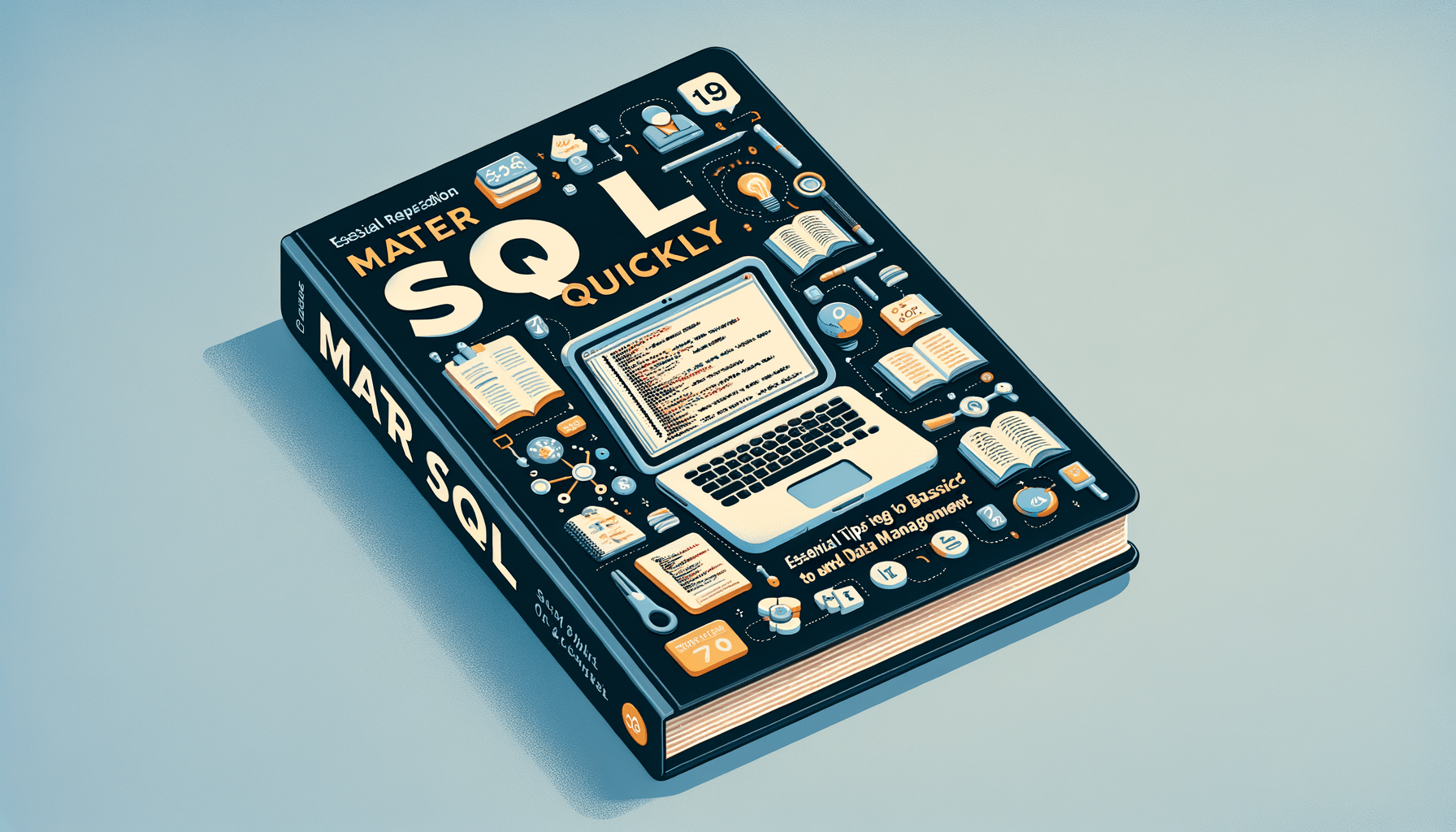A big variety of articles and resources

Is it possible to learn SQL in 3 months?
 Sia Author and Instructor
Learn SQL
Sia Author and Instructor
Learn SQL
11 minute read
Learning SQL in three months might seem tough, but it's possible with the right plan and resources. SQL, or Structured Query Language, is key for managing and querying databases. Whether you're a beginner or have some experience, setting clear goals and using the right tools can help you succeed.
Key Takeaways
- Understanding SQL basics is the first step to mastering it.
- Setting realistic goals and a study plan helps you stay on track.
- Using a mix of books, online courses, and practice platforms can boost your learning.
- Hands-on practice and real-world projects make learning more effective.
- Regular feedback and assessments can guide your progress and highlight areas to improve.
Understanding the Basics of SQL
Defining SQL and Its Importance
Structured Query Language, or SQL, is the standard language for managing and manipulating databases. It's crucial for anyone working with data because it allows us to retrieve, update, and manage data efficiently. SQL is used in various fields, from business to healthcare, making it a versatile skill.
Historical Context of SQL
SQL was developed in the 1970s by IBM researchers. Over the years, it has become the go-to language for database management. Its long history means it has been refined and improved, making it reliable and powerful.
Core Concepts in SQL
To get started with SQL, we need to understand some core concepts:
- Tables: These are the basic units where data is stored.
- Queries: These are requests to retrieve or manipulate data.
- Joins: These combine data from multiple tables.
Understanding these basics will help us build a strong foundation in SQL.
Setting Realistic Learning Goals
Assessing Your Current Skill Level
Before diving into SQL, it's crucial to understand where we stand. We should evaluate our current knowledge of databases and programming. This helps us set a starting point and tailor our learning path. Knowing our strengths and weaknesses allows us to focus on areas that need improvement.
Creating a Study Plan
A well-structured study plan is essential for learning SQL in three months. We should break down our goals into smaller, manageable tasks. This could include daily or weekly targets. A good plan balances learning new concepts and practicing them.
Balancing Theory and Practice
To master SQL, we need to balance theory with hands-on practice. While understanding the concepts is important, applying them in real-world scenarios is equally crucial. We can use practice platforms and work on sample databases to reinforce our learning.
Setting realistic goals and sticking to a study plan can make the learning process smoother and more effective.
Essential Resources for Learning SQL
When it comes to learning SQL, it's crucial to have access to a variety of resources that can support our journey. From books and online courses to interactive tutorials and practice platforms, these tools play a significant role in our learning process. Additionally, being part of a community and having support networks can enhance our understanding and provide valuable insights. By utilizing a combination of these resources, we can strengthen our SQL skills and progress effectively in our learning path.
Structured Query Language Syntax and Semantics
Basic SQL Commands
When starting with SQL, it's crucial to understand the basic commands. These include SELECT, INSERT, UPDATE, and DELETE. Mastering these commands will allow us to perform essential database operations. For example, the SELECT command helps us retrieve data from a database, while INSERT lets us add new records.
Advanced SQL Functions
Once we're comfortable with the basics, we can move on to advanced functions like JOIN, GROUP BY, and HAVING. These functions enable us to handle more complex queries and data manipulations. For instance, the JOIN function is used to combine rows from two or more tables based on a related column. This is particularly useful when dealing with large datasets.
Common SQL Mistakes to Avoid
Even experienced users can make mistakes in SQL. Some common errors include forgetting to use the WHERE clause in an UPDATE or DELETE statement, which can lead to unintended changes. Another frequent mistake is not properly indexing tables, which can slow down query performance. By being aware of these pitfalls, we can write more efficient and accurate SQL queries.
Understanding the syntax and semantics of SQL is essential for anyone looking to work with databases effectively. By mastering both basic and advanced commands, and being mindful of common mistakes, we can become proficient in SQL.
Hands-On Practice and Real-World Applications
Building Sample Databases
Creating sample databases is a great way to understand SQL better. We can start with simple databases and gradually move to more complex ones. This hands-on approach helps us see how SQL works in real life. Building these databases will give us the confidence to handle real-world data.
Solving Real-World Problems
To truly learn SQL, we need to solve real-world problems. This means working on projects that mimic real-life scenarios. For example, we can work on a project that involves managing a library's book inventory. This will help us apply what we've learned in a practical way. Gaining practical SQL skills with real-world problems is essential for mastering SQL.
Participating in SQL Challenges
Joining SQL challenges is another excellent way to practice. These challenges often come with problems that require creative solutions. They push us to think outside the box and improve our skills. Participating in these challenges can be both fun and educational.
Working on hands-on projects and solving real-world problems is crucial for learning SQL. It helps us understand how SQL is used in everyday situations and prepares us for real-world applications.
Time Management Strategies for SQL Learning
Allocating Study Time Effectively
To master SQL in three months, we need to allocate our study time wisely. Creating a consistent schedule helps us stay on track. We should aim for daily study sessions, even if they are short. This way, we can build a habit and keep the information fresh in our minds.
Overcoming Procrastination
Procrastination can be a major hurdle. One way to overcome it is by breaking down our study goals into smaller, manageable tasks. This makes the learning process less overwhelming and more achievable. Additionally, setting deadlines for each task can keep us motivated and focused.
Tracking Your Progress
Keeping track of our progress is crucial. We can use a journal or an app to log our daily study activities. This not only helps us see how far we've come but also identifies areas where we need to improve. Regular self-assessment ensures that we are on the right path to mastering SQL.
By following these strategies, we can effectively manage our time and make significant progress in learning SQL within three months.
The Role of Feedback and Assessment
Self-Assessment Techniques
To gauge our progress, we should regularly use self-assessment techniques. This can include setting mini goals and checking if we meet them. Self-assessment helps us understand our strengths and weaknesses. For example, after completing a mini course: SQL query crafting, we can test our skills by writing essential SQL queries and solving small problems.
Peer Reviews and Group Studies
Working with others can be very helpful. Peer reviews and group studies allow us to see different ways of solving the same problem. We can learn advanced reporting skills and improve our understanding by discussing with peers. Group studies also make learning more fun and less lonely.
Utilizing Online Quizzes and Tests
Online quizzes and tests are great tools for feedback. They provide instant results and show us where we need to improve. These tools can help us in data-driven decision making by highlighting areas that need more practice. Regularly taking quizzes can also prepare us for real-world applications and career advancement in data analysis and marketing.
Consistent feedback and assessment are key to mastering SQL. They help us stay on track and make sure we are learning effectively.
Integrating SQL with Other Technologies
SQL and Data Analytics
In the world of data analytics, SQL is a powerful tool. It helps us pull out important information from large sets of data. For example, a data analyst can use SQL to find trends and patterns that help businesses make smart choices. SQL is often the first step in turning raw data into useful insights.
SQL in Web Development
SQL is also key in web development. Websites that store user information, like social media sites, use SQL to manage their databases. When you log in or post a comment, SQL commands are working behind the scenes to store and retrieve your data. This makes SQL a must-know for web developers.
SQL and Cloud Computing
Cloud computing has changed how we store and access data. SQL works well with cloud services like Amazon Web Services (AWS) and Google Cloud. These services offer tools that make it easy to use SQL in the cloud. This means we can handle large amounts of data quickly and efficiently.
SQL is a versatile tool that fits well with many technologies. Whether you're working in data analytics, web development, or cloud computing, knowing SQL can make your job easier and more effective.
Overcoming Common Learning Obstacles
When learning SQL, we may encounter challenges that test our understanding and perseverance. One obstacle is dealing with complex questions that require critical thinking and problem-solving skills. Another hurdle is grasping the concept of how databases are designed, which forms the foundation of SQL proficiency. Lastly, staying motivated throughout the learning journey can be tough, but setting small goals and celebrating achievements can help us stay on track.
Evaluating Your SQL Proficiency After Three Months
Benchmarking Your Skills
After three months of learning SQL, it's important to see how far we've come. We can start by comparing our current skills to the goals we set at the beginning. This helps us understand our progress and identify areas where we need more practice. Regular self-assessment is key to staying on track.
Identifying Areas for Improvement
Once we've benchmarked our skills, we should look for areas that need improvement. Maybe we struggle with complex queries or database design. By pinpointing these weak spots, we can focus our efforts on getting better in those areas. This targeted approach makes our learning more effective.
Planning for Continued Learning
Learning SQL doesn't stop after three months. We should plan for continued learning to keep our skills sharp. This might include taking advanced courses, joining SQL communities, or working on real-world projects. By staying engaged, we ensure that our SQL knowledge continues to grow.
It's important to remember that learning is a journey, not a destination. By regularly evaluating our progress and setting new goals, we can keep moving forward in our SQL learning adventure.
After three months of diving into SQL, it's time to see how far you've come. Are you ready to test your skills and see where you stand? Visit our website to take a quick quiz and find out!
Conclusion
In summary, learning SQL in three months is a realistic goal for many people. With dedication, regular practice, and the right resources, you can grasp the basics and even some advanced concepts within this timeframe. It's important to set clear goals, follow a structured learning plan, and seek help when needed. While three months may not make you an expert, it can certainly provide a strong foundation to build upon. Remember, continuous learning and practice are key to mastering SQL or any other skill.
Frequently Asked Questions
Can I really learn SQL in just three months?
Yes, it's possible to learn SQL in three months if you stay dedicated and follow a good study plan.
What are the basics I need to know to start learning SQL?
You should start with understanding what SQL is, why it’s important, and its core concepts like tables, queries, and commands.
How can I assess my current skill level in SQL?
You can take online quizzes or try out some beginner-level SQL exercises to see where you stand.
What resources are best for learning SQL?
Books, online courses, interactive tutorials, and community forums are great resources to start with.
How much time should I spend practicing SQL each day?
It’s good to spend at least an hour a day practicing SQL to make steady progress.
What are common mistakes to avoid when learning SQL?
Avoid skipping the basics, not practicing enough, and not asking for help when you’re stuck.
How can I stay motivated while learning SQL?
Set small goals, track your progress, and reward yourself when you achieve them.
What should I do after learning SQL for three months?
Evaluate your skills, identify areas where you need improvement, and plan for continued learning.
Related Articles

How to Learn SQL: Insights and Tips from Reddit
9 minute read

Learn SQL Quickly: Tips and Tricks for Rapid Mastery
8 minute read





